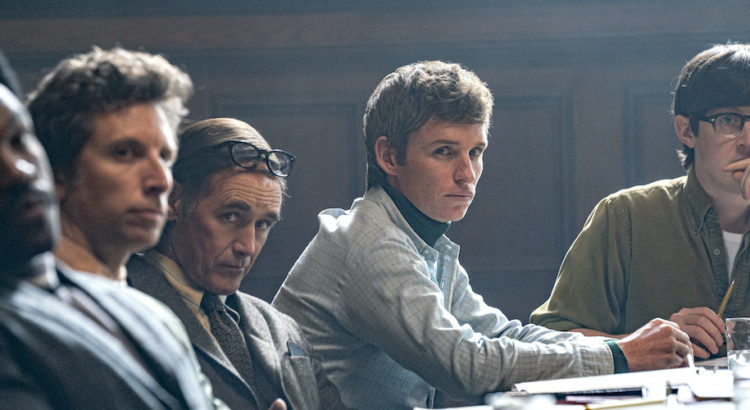Spoilers ahead, but this film is based on a historical event so…
The Trial of the Chicago 7, written and directed by Aaron Sorkin, follows the court case in which eight, later seven, defendants were accused of conspiracy during the summer of 1968. The defendants were accused of inciting riots during the Democratic National Convention which took place during a particularly turbulent time of anti-Vietnam War and counterculture protests and the civil rights movement. The film stars Sacha Baron Cohen, Eddie Redmayne, Joseph Gordon-Levitt, Yahya Abdul-Mateen II, Jeremy Strong, Mark Rylance, and Michael Keaton.
The film, overall, is fine. The acting is quite good – Sacha Baron Cohen proves he can take on a dramatic role; Jeremy Strong proves he can take on a comedic role; Eddie Redmayne, Joseph Gordon-Levitt, Yahya Abdul-Mateen II, Mark Rylance, and Michael Keaton all prove that they still know how to act. Aaron Sorkin proves, once again, that he is capable of writing snappy dialogue, and also that maybe he should leave the directing to someone else. The film has been executed in the same manner as The Social Network – written by Sorkin, directed by David Fincher – with its fast-speaking actors and more light-hearted, generally goofier dramatization of a legal case. However, this kind of style seems better-suited to lawsuits involving Mark Zuckerberg and the events of his college days rather than a court case addressing antiwar protests and racial tensions.
The film is not insensitive. That sentence is not meant as a litotes – I am not trying to say that the film is not not insensitive. I just left the film confused about how I was supposed to feel. The film includes lines such as “Who started the riots?” and “the police don’t start riots,” and it ends with defendant Tom Hayden reading off the names of Americans who had died in Vietnam as Judge Hoffman demands that there be order in the court. The film also depicts Judge Julius Hoffman ordering that the eighth defendant, Black Panther Party co-founder Bobby Seale, be bound, gagged, and chained to his chair for disrupting the court, despite his fellow white defendants being equally, if not more, disruptive. Seale was ultimately severed from the case – this is what makes it the Trial of the Chicago 7, not 8 – and the case was inherently about the Vietnam War rather than civil rights, however it is impossible to watch this film about protests, rioting, and police brutality in 2020 without drawing connections to race and racism. There was no way for Sorkin to predict the political climate of summer 2020, but “here is a film about some things that happened during the summer of 1968” comes across as a little lackluster. Sorkin does not take the police brutality, Vietnam death toll, or blatant racism against Seale lightly, but after having seen films that successfully balance humor and a modern political perspective on historical events – Blackkklansman comes to mind – The Trial of the Chicago 7 just falls a little flat.
Perhaps it is just simply disheartening to see the evolution of racism and police brutality since 1968. And it is a little bizarre to see this timely film take on the same tone as a film where Andrew Garfield and Jesse Eisenberg argue about feeding chicken nuggets to a chicken. That being said, The Trial of the Chicago 7 may not be revolutionary, but that does not mean it is inherently a bad film.
The Trial of the Chicago 7 is now streaming on Netflix.


